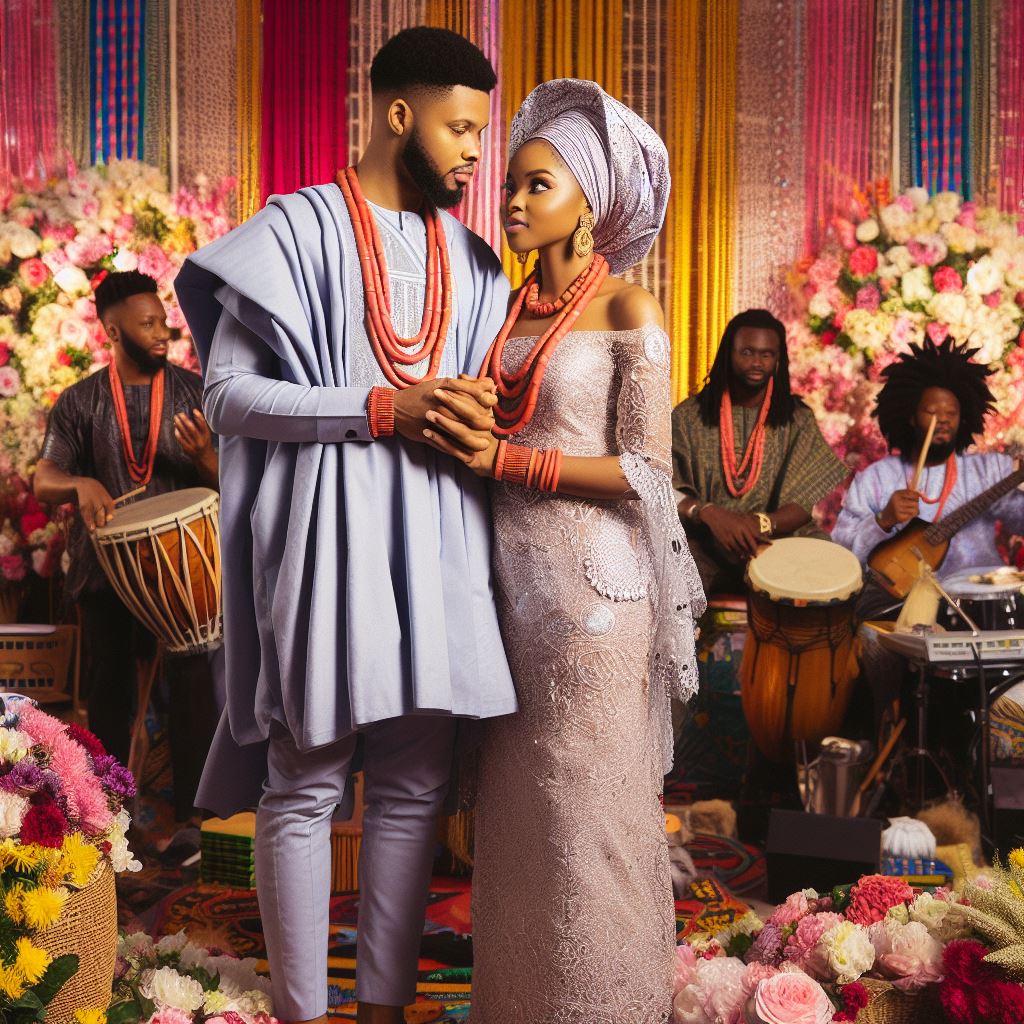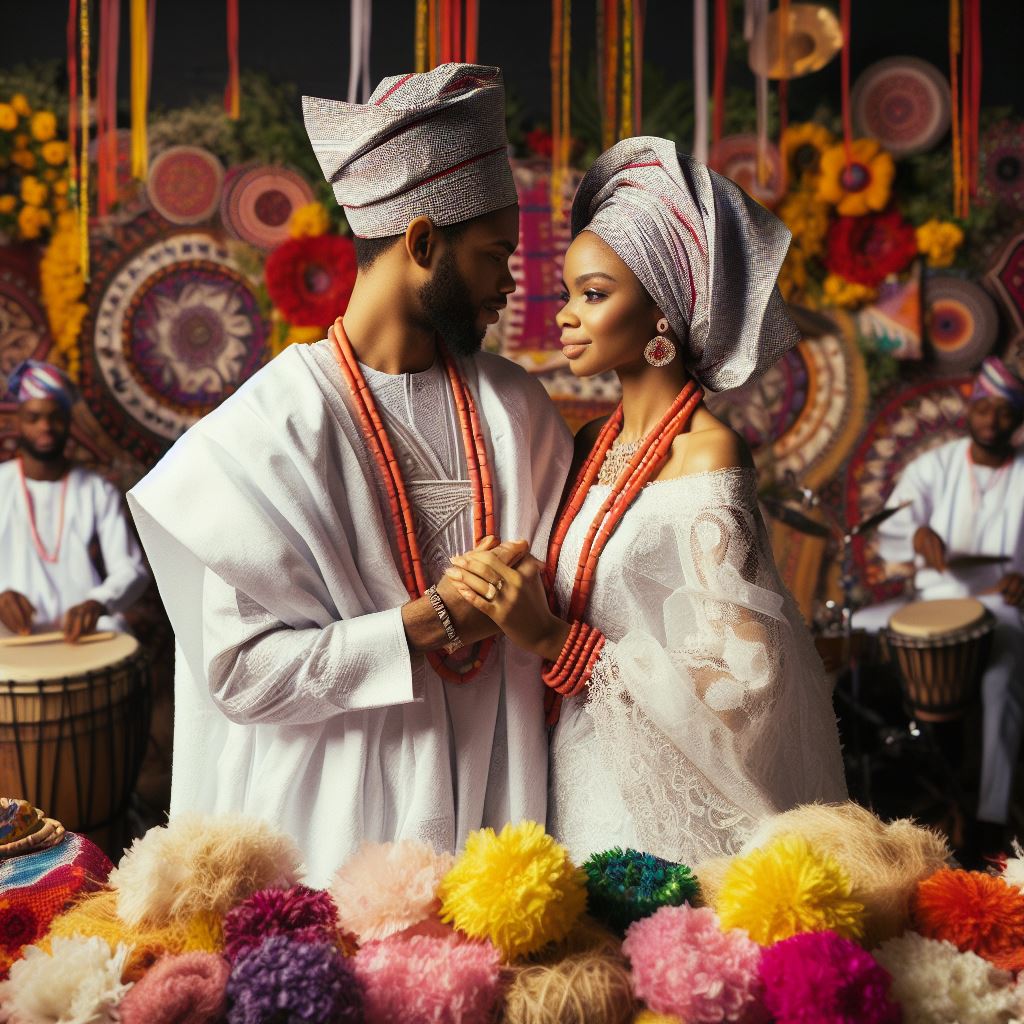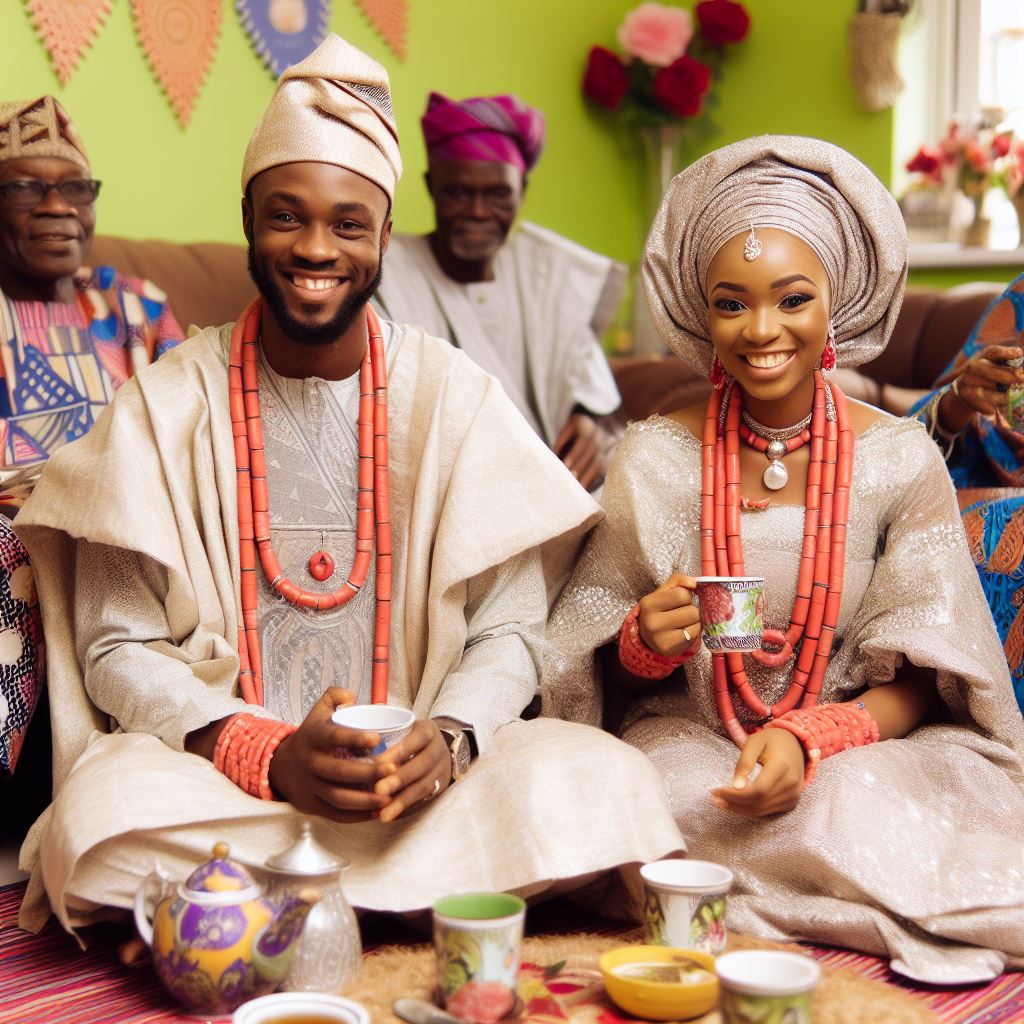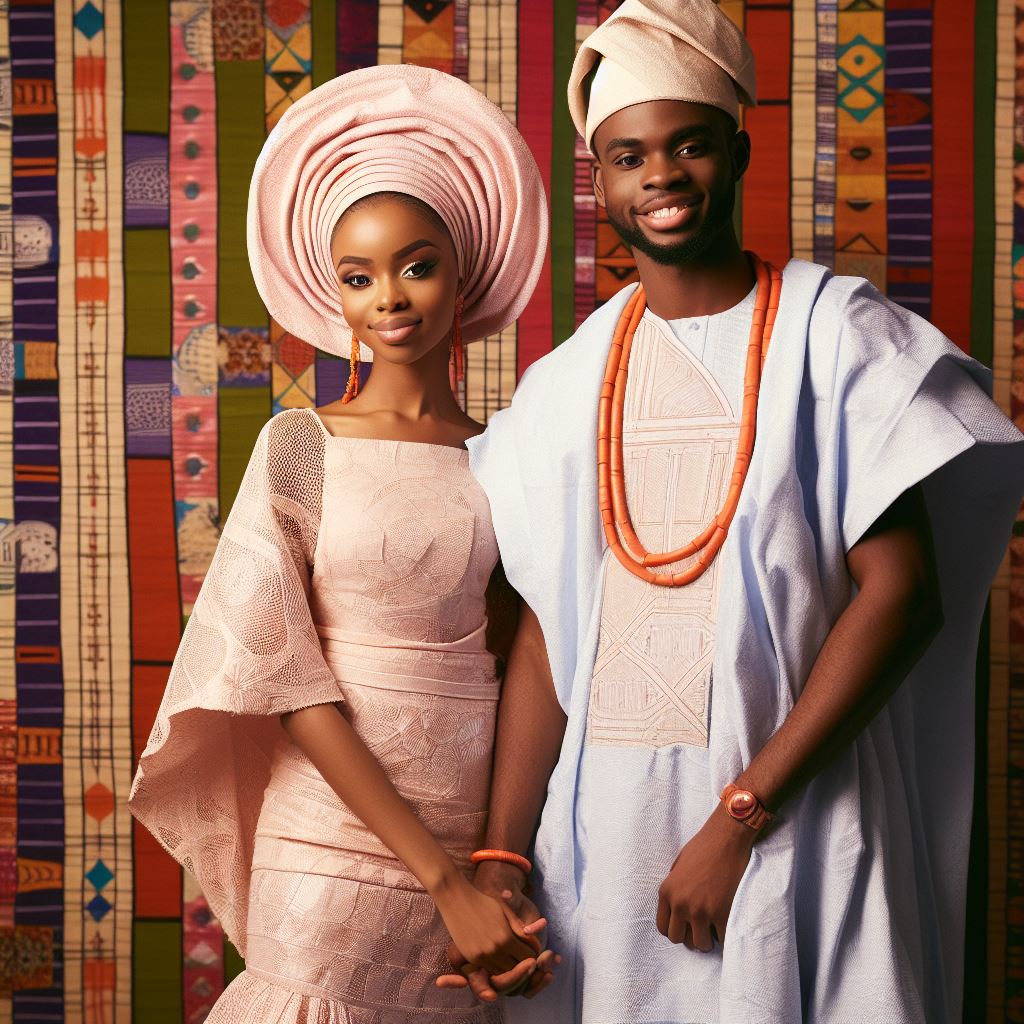Introduction
Nigerian marriage traditions
Nigerian marriage traditions vary greatly among ethnic groups. In this section, we will focus on the Hausa, Yoruba, and Igbo peoples.
These three ethnic groups have distinct cultural practices and customs when it comes to marriage.
The three major ethnic groups in Nigeria: Hausa, Yoruba, and Igbo
The Hausa people, predominantly located in Northern Nigeria, have a strong Islamic influence on their marriage traditions.
Polygamy is widely accepted, and marriages are arranged by the families.
The consent of the bride and groom is important, but ultimately, it is the decision of their families. The wedding ceremony, called “Gani,” is a grand celebration with elaborate traditional outfits and music.
The Yoruba people, located in Southwest Nigeria, have both traditional and modern marriage practices. Yoruba marriages are usually monogamous, with some exceptions.
A significant aspect of Yoruba marriages is the engagement ceremony, known as “Igba Nkwu,” where the bride’s family presents gifts to the groom’s family.
Yoruba weddings are known for their vibrant colors, traditional attire, and lively music.
The Igbo people, found in the southeastern region of Nigeria, have unique marriage customs.
Igbo marriages involve a series of events, including the introduction, the “Iku Aka” ceremony, and the main wedding ceremony called “Igba Nkwu Nwanyi.”
The bride’s family plays a vital role in the negotiations and arrangements of the marriage. The Igbo wedding ceremony is a colorful event with cultural performances and traditional attires.
While Nigerian marriage traditions share some common elements, the Hausa, Yoruba, and Igbo ethnic groups have distinct practices.
Understanding these differences allows us to appreciate and respect the diversity within Nigerian culture.
Hausa Marriage Traditions
Pre-marriage customs and rituals
Hausa marriage traditions are deeply rooted in cultural practices and Islamic customs.
The journey of marriage starts with the courting process, which involves the families of the potential couple coming together to discuss the union.
Highly valued is parental involvement, as the approval and blessings of both families are crucial for a successful marriage.
One distinct feature of Hausa marriage customs is the payment of the bride price, known as sadaki.
It is a significant gesture that demonstrates the groom’s commitment and appreciation to the bride’s family.
The amount of the bride price can vary depending on various factors, including the bride’s family’s status and negotiation skills.
Wedding ceremonies
Wedding ceremonies among the Hausa people are colorful and vibrant. The introduction of the groom to the bride’s family, known as kayan zafi, marks the official recognition of the union.
It is an opportunity for both families to mingle, exchange pleasantries, and exchange gifts. This event strengthens the bond between the families and establishes a sense of unity.
The traditional engagement ceremony, fatihah, is an essential part of Hausa weddings.
It is conducted in adherence to Islamic beliefs and involves the couple giving their consent to marriage in the presence of witnesses.
This ceremony symbolizes the bride and groom’s commitment to each other and their willingness to embark on a lifelong journey together.
The wedding feast, walima, is a grand celebration with abundant food, music, and dancing. The bride’s family takes great pride in organizing this feast to honor their daughter and showcase their hospitality.
It is a joyous occasion where family, friends, and community members come together to celebrate love and union.
Post-marriage rituals
After the wedding ceremony, the bride moves into her husband’s home, where she will start her new life as a married woman.
This transition is symbolized by the act of crossing the threshold of her new home.
Both the husband and wife now establish their roles within their immediate and extended families, contributing to their community’s well-being and maintaining family ties.
Hausa marriage traditions encompass various customs and rituals that symbolize unity, respect, and commitment.
The courting process, payment of the bride price, wedding ceremonies, and post-marriage rituals all contribute to the richness and distinctiveness of Hausa marriages.
These traditions play a vital role in strengthening family bonds, community ties, and the overall fabric of Hausa society.
Read: The Role of Husbands & Wives: Exploring Ephesians 5
Yoruba Marriage Traditions
Yoruba marriage traditions are rich in cultural significance and play a crucial role in uniting families and communities.
These traditions encompass various stages, from pre-marriage customs and rituals to wedding ceremonies and post-marriage rituals. Let’s explore these Yoruba marriage traditions in detail.
Pre-marriage customs and rituals
Pre-marriage customs and rituals in Yoruba culture are essential to gauge the compatibility and commitment of the couple.
One significant aspect is the introduction of the groom’s family to the bride’s family, known as “mo mi l’owo.” This ceremony allows both families to interact and establish a bond before the wedding.
Another crucial pre-marriage ritual is the discussions and negotiations on the bride price, known as “ijoko.”
The groom’s family offers gifts and negotiates the dowry amount to be paid for the bride. This process symbolizes the groom’s intention to take responsibility for the bride’s well-being.
Wedding ceremonies
Yoruba wedding ceremonies are elaborate affairs filled with vibrant colors, music, and dance.
The traditional engagement ceremony, known as “ikuwuwaju,” marks the official union between the couple’s families.
During this ceremony, the families exchange gifts and perform cultural rituals to bless the couple and their future together.
In addition to the traditional engagement, the Yoruba wedding also includes the exchange of gifts and the payment of the dowry, known as “eniyan.”
The groom’s family presents gifts such as clothes, jewelry, and household items to the bride’s family.
The dowry payment signifies the groom’s ability to provide for his new wife and showcases the couple’s readiness for marriage.
Yoruba couples also have the option of incorporating religious ceremonies into their wedding.
The couple may choose to have a Nikkah, an Islamic religious ceremony, or a Church wedding, known as “isioma.”
These ceremonies are conducted by religious leaders and serve as a spiritual union of the couple in the presence of their loved ones.
Post-marriage rituals
After the wedding, Yoruba marriage traditions include various post-marriage rituals that solidify the couple’s bond.
One such ritual is the spraying of money on the couple, popularly known as “dollar rain.” This act symbolizes financial blessings and is believed to bring prosperity to the couple’s future together.
Another post-marriage ritual is the couple’s transition to the husband’s compound, known as “ile-oke.”
It is customary for the bride to move into her husband’s family home, integrating herself into the husband’s extended family and community.
The establishment of the new family unit is a crucial post-marriage ritual in Yoruba culture.
The couple must uphold cultural values, raise children, and contribute to their extended family and community for a strong, harmonious family.
Yoruba marriage traditions encompass pre-marriage customs and rituals, wedding ceremonies, and post-marriage rituals.
These traditions play a significant role in strengthening family ties, preserving cultural heritage, and fostering unity within the Yoruba community.
Read: God’s Plan for Marriage: Rooted in Biblical Scriptures
Igbo Marriage Traditions
The Igbo people, one of the major ethnic groups in Nigeria, have rich and diverse marriage traditions.
These traditions reflect their deep cultural and spiritual beliefs, as well as their social structures.
Igbo marriage traditions can be divided into three main categories: pre-marriage customs and rituals, wedding ceremonies, and post-marriage rituals.
Pre-marriage customs and rituals
Before the wedding takes place, there are several customs and rituals that the Igbo people follow.
Firstly, there is the introduction of the groom’s family to the bride’s family, known as “ime ego.”
This is an important step that establishes the connection and relationship between the two families. It involves formal greetings, exchanging of pleasantries, and the presentation of gifts.
The next custom is the confirmation of the bride price and marriage intention, known as “ikpo aka.”
The groom’s family brings a representative to the bride’s family’s home to discuss and negotiate the bride price.
The groom pays the bride price in cash or valuable items, symbolizing his appreciation and commitment to the bride’s family.
Upon agreement, marriage intentions are confirmed, and both families prepare for the wedding.
Wedding ceremonies
The wedding ceremonies in Igbo culture are vibrant and colorful, filled with traditional rituals and customs.
The first ceremony is the “igba nkwu” or traditional engagement.
This ceremony marks the official union of the couple and involves the exchange of gifts and the declaration of their commitment to each other.
It is usually attended by family members, relatives, and close friends, who witness the couple’s solemn vows.
Another important tradition is the exchange of gifts and dowry payment, known as “idu uno.”
The groom’s family presents gifts to the bride’s family as a symbol of appreciation and respect.
Additionally, the groom’s family fulfills the agreed bride price by presenting it to the bride’s family.
This exchange signifies the merging of the two families and the acceptance of the bride into the groom’s family.
The wine carrying ceremony, “iki-ocha,” is another essential part of Igbo wedding traditions.
It symbolizes the couple’s willingness to share and support each other in times of joy and sorrow.
The groom’s family carries palm wine, which represents the bride’s fertility and abundance, while the bride’s family carries palm wine cups as a symbol of acceptance and unity.
The couple then takes turns drinking from the cups, sealing their commitment to each other.
Post-marriage rituals
After the wedding ceremonies, there are several post-marriage rituals that take place within the Igbo community.
One of these rituals is the welcoming of the bride into the husband’s compound, known as “imenmala.”
The bride is received with warmth and excitement as she enters her new home. This symbolizes the groom’s family acceptance of the bride as one of their own.
Traditional dances and celebrations are also an integral part of Igbo post-marriage rituals. The community comes together to rejoice and honor the newly married couple.
Colorful costumes, music, and dance performances are common during these celebrations. It is a way for the community to show their support and blessings to the couple as they begin their journey together.
Lastly, there is the integration of the couple into the community, known as “igba eze.”
This ritual involves introducing the couple to the traditional ruler of the community, who blesses the union and offers guidance and advice.
It is a significant step in solidifying the couple’s position and status within the community.
Igbo marriage traditions are deeply rooted in the cultural and spiritual beliefs of the Igbo people.
From pre-marriage customs and rituals to wedding ceremonies and post-marriage rituals, each step carries symbolic meanings and reinforces the importance of family, unity, and community.
These traditions not only provide a framework for the wedding festivities but also serve as a way to preserve and pass down the rich heritage of the Igbo culture.
Read: Navigating Marital Challenges: Guidance from the Bible
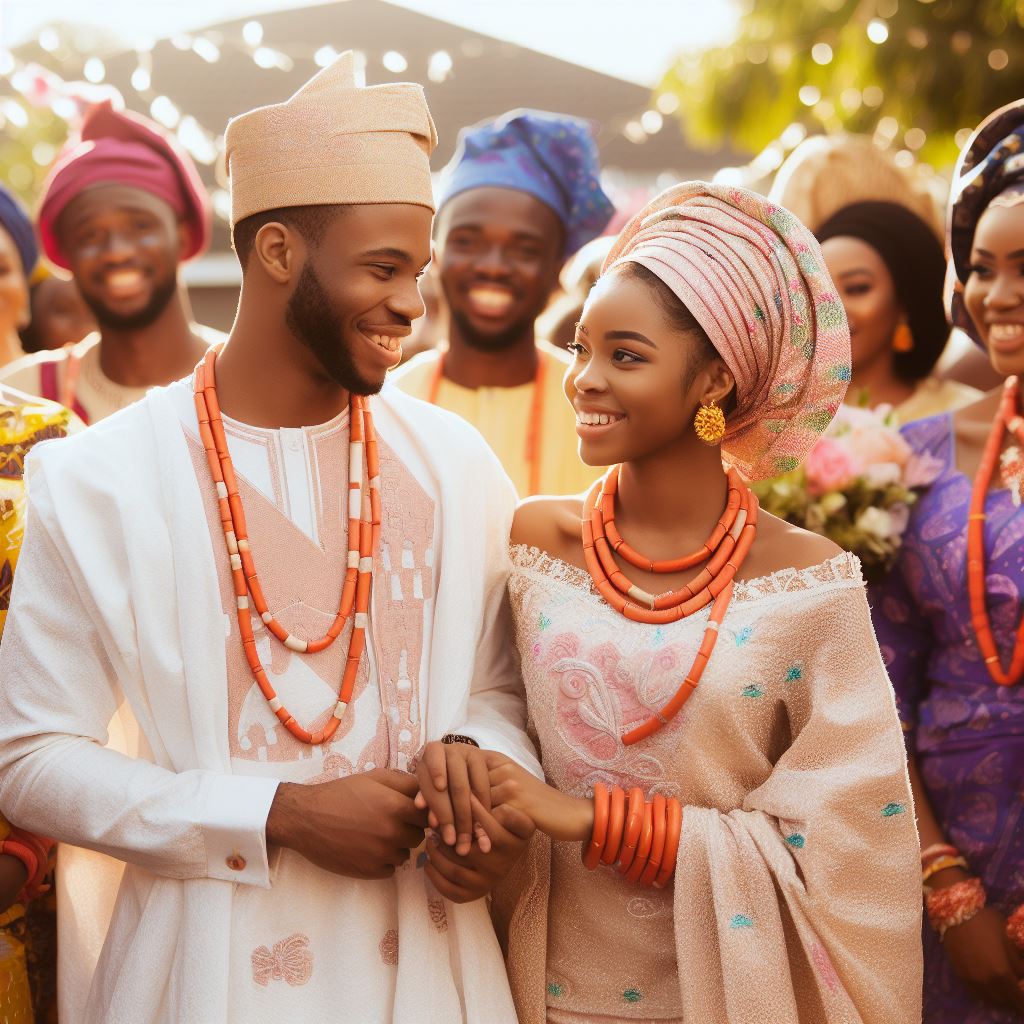
Comparison of Hausa, Yoruba, and Igbo Marriage Traditions
Similarities
In examining the marriage traditions of the Hausa, Yoruba, and Igbo cultures, it becomes evident that while some similarities exist, there are also significant differences.
These differences are manifested in various aspects of the marriage process, including pre-marriage customs, wedding ceremonies, and post-marriage rituals. Let’s explore these aspects in more detail.
Firstly, parental involvement is of utmost importance in all three cultures. Parents play a crucial role in arranging marriages and ensuring compatibility between the couple.
They typically make decisions based on factors such as social status, family background, and personal preferences.
This involvement showcases the significance of family ties and community values in these cultures.
Another shared practice among the Hausa, Yoruba, and Igbo cultures is the exchange of gifts and dowry payments.
This tradition symbolizes the union of two families and serves as a form of appreciation and respect. It solidifies the bond between the families and provides financial security for the newlywed couple.
Differences
However, there are notable differences in pre-marriage customs and rituals. In the Hausa culture, for example, the groom’s family sends representatives to formally propose to the bride’s family.
The groom’s family prepares for the wedding after reaching an agreement during discussions about the marriage terms.
On the other hand, in Yoruba culture, the bride receives a visit from the groom’s family, bringing gifts and expressing their intention to marry.
The couple then undergoes a series of traditional rites and rituals before the wedding can take place.
In Igbo culture, both families exchange visits and gifts, culminating in the ‘Iku Aka’ (knocking on the door) ceremony, where the groom’s family formally asks the bride’s family for her hand in marriage.
Furthermore, wedding ceremonies and religious practices differ significantly across these cultures.
Islamic customs guide Hausa weddings, with the ceremony occurring in the bride’s home.
Yoruba weddings, on the other hand, prominently feature rituals worshipping the Yoruba deities, and ceremonies can range from traditional to modern.
Igbo weddings blend Christian traditions and cultural rituals, famous for vibrant dances and masquerades.
Lastly, the post-marriage rituals and integration into the community also vary between these cultures.
The Hausa culture emphasizes the bride’s integration into her husband’s family and community. The new bride must adapt to her new environment and actively engage in household and community activities.
In Yoruba culture, she becomes part of her husband’s family, participating in family affairs.
Read: Biblical Foundations: Building Strong Marriages in Faith
Delve into the Subject: How Modern Trends are Shaping Nigerian Marriage Norms
Conclusion
Recap of the main points discussed
- Hausa, Yoruba, and Igbo marriage traditions have unique customs and practices.
- Hausa weddings are elaborate events with rich cultural rituals and traditions.
- Yoruba marriage ceremonies involve the exchange of gifts and dowry negotiations.
- Igbo weddings are characterized by the presence of a village elders’ council.
Rich diversity and cultural significance of Nigerian marriage traditions
These three ethnic groups showcase the rich cultural tapestry of Nigeria, each with its own distinct practices and customs.
Understanding and appreciating these traditions is crucial for fostering cultural appreciation and tolerance.
Closing thoughts on the importance of understanding and appreciating different cultural practices
By learning about and respecting the marriage traditions of Hausa, Yoruba, and Igbo people, we can foster cultural harmony and celebrate the beauty of diversity.
It is through this understanding that we can build bridges across cultures and create a more inclusive and tolerant society.

